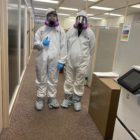
We need effective contact tracing with privacy protections to open NJ’s economy and save lives. In NJ, more than 12,000 people in the last three months have died from COVID-19 – more than we lost during all of WWII. During this same time period as Governor Murphy issued his stay-at-home order that shut down all but essential businesses, more than one million people in NJ claimed unemployment and the budget deficit over the next year is now predicted to be close to $10 billion dollars. During this past week, my committee, the Assembly Science Innovation and Technology Committee, together with the Assembly Community Development and Affairs Committee chaired by Assemblywoman Shavonda Sumter held a hearing on one of the key tools needed to reopen NJ’s economy safely: contact tracing.
Contact tracing has been a weapon in the battle to prevent the spread of communicable diseases for decades. According to the World Health Organization, the eradication of smallpox, for example, was achieved in 1979 not by universal immunization, but by exhaustive contact tracing. Diseases for which contact tracing is commonly performed include tuberculosis, vaccine-preventable infections like measles, sexually transmitted infections (including HIV), blood-borne infections, some serious bacterial infections, and novel infections (e.g. SARS-CoV, H1N1, and COVID-19).
Technology plays a crucial role in contact tracing, and as our world has been more technologically advanced, our personal data have become more vulnerable. While NJ has no plans to develop a contact tracing app that we would download on our phones to track our movements, it does intend to use a central database to store contact tracing data in “the cloud.” This information, collected through telephone calls to those suspected of being in close contact with someone that has tested positive for COVID-19, will include your name, ask about how you are feeling, ask about others with whom you may have had close contact, and ask that you quarantine yourself. You will NEVER be asked for money, your social security number, bank information, immigration status, or other personally protected information. READ MORE







